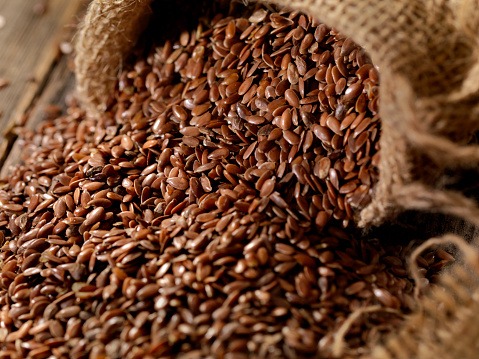Unlocking the Nutritional Powerhouse: Flax Seeds and Their Health Benefits
Benefits of Flax Seeds
Preeti Sinha
9/30/20233 min read


In the realm of superfoods, few contenders can match the versatility and nutritional prowess of flax seeds. These tiny seeds, derived from the flax plant (Linum usitatissimum), have been revered for their health benefits for centuries. From their rich nutrient profile to their potential in preventing chronic diseases, flax seeds have earned their reputation as a nutritional powerhouse. In this blog, we'll explore the many health benefits of flax seeds and why you should consider incorporating them into your diet.
Nutritional Profile
Before diving into their health benefits, let's take a moment to appreciate the impressive nutritional content of flax seeds:
1. Omega-3 Fatty Acids: Flax seeds are an excellent source of alpha-linolenic acid (ALA), a type of omega-3 fatty acid. Omega-3s are renowned for their heart-healthy properties, including reducing inflammation and lowering the risk of heart disease.
2. Fiber: Flax seeds are rich in dietary fiber, both soluble and insoluble. This fiber content aids in digestion, helps regulate blood sugar levels, and promotes a feeling of fullness, making them a valuable addition to weight management diets.
3. Lignans: Flax seeds are the most abundant dietary source of lignans, a type of phytoestrogen. Lignans have antioxidant properties and may play a role in preventing certain cancers, including breast and prostate cancer.
4. Protein: These seeds are a good source of plant-based protein, making them an excellent choice for vegetarians and vegans looking to meet their protein needs.
5. Vitamins and Minerals: Flax seeds contain essential vitamins and minerals, including vitamin B1, vitamin B6, folate, calcium, magnesium, and zinc.
Now, let's explore the numerous health benefits associated with flax seeds:
1. Heart Health
Flax seeds are heart-healthy superstars. The high content of omega-3 fatty acids helps reduce inflammation, lower blood pressure, and decrease the risk of cardiovascular diseases. Regular consumption of flax seeds has been linked to a reduced risk of stroke and heart attacks.
2. Digestive Health
The fiber in flax seeds supports digestive health in multiple ways. It promotes regular bowel movements, prevents constipation, and supports a healthy gut microbiome. The mucilage content in flax seeds forms a gel-like substance when mixed with water, which can help soothe gastrointestinal discomfort.
3. Weight Management
The combination of fiber, protein, and healthy fats in flax seeds helps control appetite and promote a feeling of fullness. This can aid in weight management and reduce the likelihood of overeating.
4. Hormonal Balance
The lignans in flax seeds may help balance hormones in the body, particularly in women. They have been associated with reduced menopausal symptoms, including hot flashes, and may offer protection against hormone-related cancers.
5. Skin Health
The anti-inflammatory and antioxidant properties of flax seeds can contribute to healthier skin. Some individuals report improvements in conditions like acne, eczema, and psoriasis with regular consumption.
6. Diabetes Management
The fiber and healthy fats in flax seeds can help stabilize blood sugar levels, making them a beneficial addition to a diabetic diet. They may also reduce insulin resistance.
7. Cancer Prevention
The lignans in flax seeds have been studied for their potential role in cancer prevention. They may inhibit the growth of cancer cells and reduce the risk of certain types of cancer, including breast, prostate, and colon cancer.
Incorporating Flax Seeds Into Your Diet
Now that you're aware of the myriad health benefits of flax seeds, you may be wondering how to incorporate them into your diet. Here are some simple ideas:
Ground Flax Seeds: Grinding flax seeds makes it easier for your body to absorb the nutrients. Add a tablespoon of ground flax seeds to your morning smoothie, cereal, or yogurt.
Flaxseed Oil: Use flaxseed oil as a salad dressing or drizzle it over cooked vegetables for an extra nutritional boost.
Flaxseed Meal: Mix flaxseed meal into pancake batter, muffin mix, or oatmeal for added texture and nutrition.
Egg Replacement: Flax seeds can be used as an egg substitute in vegan baking. Combine one tablespoon of ground flax seeds with three tablespoons of water for each egg you need to replace.
Baking: Add whole flax seeds to homemade bread, cookies, or granola for a nutty flavor and extra crunch.
It's important to start with small amounts of flax seeds and gradually increase your intake to allow your digestive system to adapt to the additional fiber.
In conclusion, flax seeds are a true nutritional powerhouse, offering an array of health benefits. Whether you're aiming to improve heart health, support digestion, manage your weight, or simply boost your overall well-being, incorporating flax seeds into your daily diet is a small but impactful step toward a healthier you. So, why not start sprinkling these tiny seeds of goodness into your meals today?
